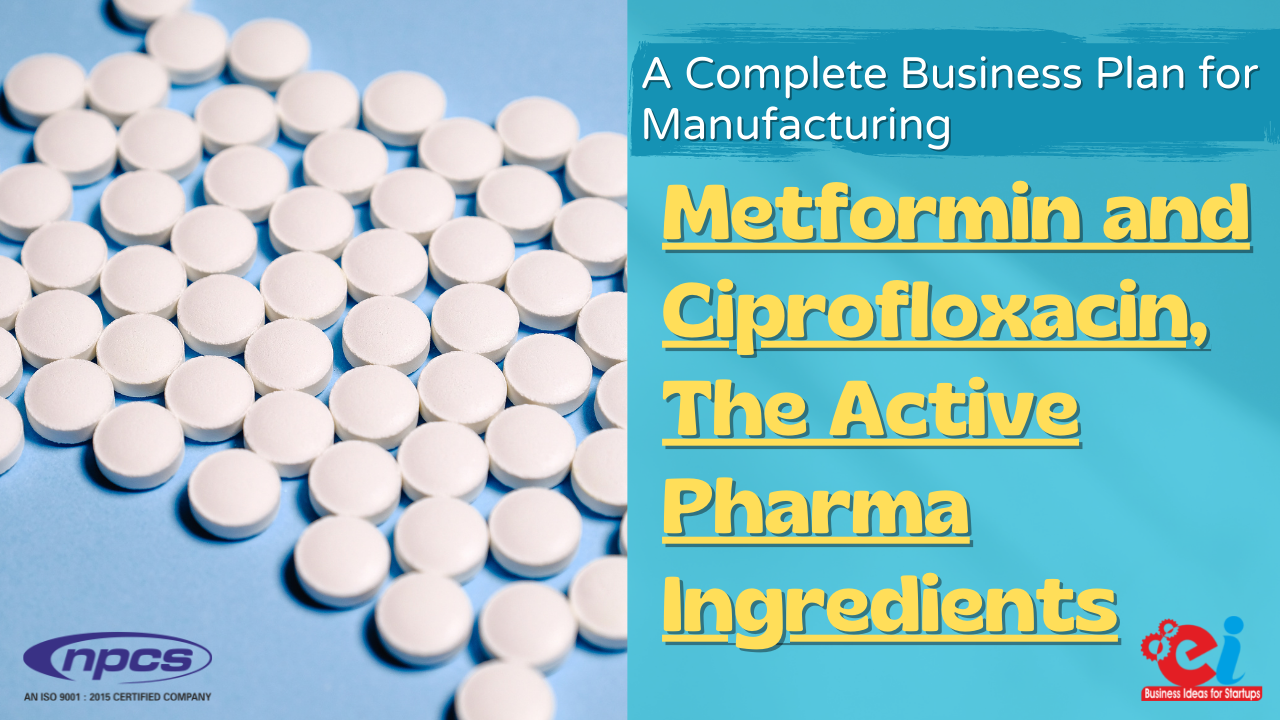Manufacturing Metformin and Ciprofloxacin represents a high-potential opportunity in the global pharmaceutical industry, particularly in emerging markets like India, Southeast Asia, and Africa. These two essential drugs are listed among the World Health Organization’s (WHO) model list of essential medicines due to their critical roles in treating chronic and acute diseases.
Metformin is the first-line medication for type 2 diabetes, while Ciprofloxacin is a powerful antibiotic used to treat various bacterial infections. Both drugs are in consistent demand, offering long-term profitability and market stability. For entrepreneurs and pharmaceutical investors, entering the API (Active Pharmaceutical Ingredient) or formulation business of these drugs can be a highly rewarding venture.
Visit this Page for More Information: Start a Business in API Industry
Understanding Metformin and Ciprofloxacin
Metformin belongs to the class of biguanides and is primarily used to control blood sugar levels in people with type 2 diabetes. It helps improve glucose tolerance, reduce hepatic glucose production, and increase insulin sensitivity.
Ciprofloxacin, on the other hand, is a second-generation fluoroquinolone antibiotic. It is effective against a wide range of gram-negative and gram-positive bacteria and is used to treat respiratory, urinary tract, gastrointestinal, and skin infections.
Read Similar Articles: Pharmaceutical Industry
Key Facts:
-
Metformin Market Size (Global): Expected to reach USD 10+ billion by 2030.
-
Ciprofloxacin Market Size (Global): Expected to grow steadily, with demand in public health systems and hospitals.
-
High Demand Areas: India, Latin America, Southeast Asia, Africa, and Eastern Europe.
Related Business Plan: Active Pharma Ingredients Metformin and Ciprofloxacin Production Business
1. Manufacturing Process of Metformin
Metformin hydrochloride (HCl) is synthesized through the chemical reaction of dimethylamine hydrochloride with cyanoguanidine.
Key Manufacturing Steps:
-
Preparation of Dimethylamine Hydrochloride
-
Reaction with Cyanoguanidine
-
Crystallization and Purification
-
Drying and Milling
-
Final QC and Packaging
Metformin is usually manufactured in its hydrochloride form and then converted into tablets or capsules during formulation.
Related Feasibility Study Reports: Active Pharmaceutical Ingredient (API) Products, Bulk API Manufacturing
Raw Materials:
-
Cyanoguanidine
-
Dimethylamine
-
Hydrochloric acid
-
Acetone
-
Purified water
2. Manufacturing Process of Ciprofloxacin
Ciprofloxacin is typically synthesized from 7-chloro-1-cyclopropyl-6-fluoro-1,4-dihydro-4-oxoquinoline-3-carboxylic acid.
Key Manufacturing Steps:
-
Condensation with Piperazine Derivatives
-
Cyclization Reaction
-
Crystallization of Ciprofloxacin Base
-
Conversion to Ciprofloxacin Hydrochloride
-
Drying and Packaging
Raw Materials:
-
7-Chloro-6-fluoroquinolone derivatives
-
Piperazine
-
Hydrochloric acid
-
Organic solvents (e.g., methanol, acetone)
Both manufacturing processes require controlled conditions to ensure chemical purity, yield efficiency, and GMP compliance.
Watch other Informative Videos: Pharmaceutical
3. Formulation of Finished Dosage Forms
Once the active pharmaceutical ingredients (APIs) are manufactured, they are formulated into:
-
Tablets (Metformin: 500 mg, 850 mg, 1000 mg)
-
Extended-release tablets (Metformin XR)
-
Ciprofloxacin tablets (250 mg, 500 mg, 750 mg)
-
Oral suspensions or IV injections (for Ciprofloxacin)
Formulation includes mixing with excipients, granulation, compression, coating (for delayed-release tablets), and final packaging.
4. Required Equipment for Manufacturing
For API Manufacturing:
-
Reactors (glass-lined or stainless steel)
-
Filtration units
-
Centrifuges
-
Dryers (Vacuum/Tray)
-
Crystallizers
-
Pulverizers
For Formulation:
-
Blenders and mixers
-
Tablet compression machines
-
Coating machines
-
Capsule filling machines
-
Strip/blister packing machines
Cleanroom setup and HVAC systems are mandatory to maintain controlled manufacturing environments.
5. Licensing and Regulatory Approvals
To manufacture Metformin and Ciprofloxacin in India or export internationally, compliance with various regulations is mandatory.
Required Licenses:
-
Drug Manufacturing License (from CDSCO & State Drug Authority)
-
GMP Certification (WHO-GMP for exports)
-
ISO 9001/14001 (optional but preferred)
-
Pollution Control Board Clearance
-
NOC from Fire and Health Departments
-
US FDA / EU GMP Compliance (for high-value export markets)
You may also need to register your products with health authorities in target countries for export purposes.
6. Market Demand and Business Potential
Why Metformin is in Demand:
-
Rising global prevalence of type 2 diabetes
-
Recommended as first-line therapy in national treatment protocols
-
Used in combination with other anti-diabetic drugs
Why Ciprofloxacin Remains Popular:
-
Broad-spectrum antibiotic for both community and hospital-acquired infections
-
Widely used in government health programs
-
Increasing demand in veterinary and aquaculture sectors
Market Segments:
-
Government tenders and hospitals
-
Pharmacies and retail drug outlets
-
Export markets (Africa, Southeast Asia, CIS countries)
-
Contract manufacturing for generic brands
7. Investment and Financial Overview
Starting a Metformin and Ciprofloxacin manufacturing unit requires moderate to high capital investment depending on whether you’re producing API, formulations, or both.
Approximate Costs:
-
Small-scale Formulation Unit: ?1.5 to ?3 Crore (?15M to ?30M)
-
Medium-scale API + Formulation Unit: ?8 to ?15 Crore
-
Running Costs: Raw material procurement, QC, utilities, manpower
Profit Margins:
-
API business: 20% to 35%
-
Formulations: 30% to 50%
-
Higher margins possible in branded exports or government contracts
8. Export Potential
Both APIs and finished formulations of Metformin and Ciprofloxacin are highly exportable under the generic drugs segment.
Target Countries:
-
Nigeria, Ghana, Kenya
-
Philippines, Vietnam, Cambodia
-
Brazil, Peru, Bolivia
-
Russia, Ukraine (Ciprofloxacin)
Registering with regulatory authorities (e.g., FDA, EMA, ANVISA) enables access to premium markets and increases brand credibility.
9. Challenges in Manufacturing
Common Challenges:
-
Regulatory compliance and audits
-
Sourcing high-purity raw materials
-
Competition with Chinese API producers
-
Price control regulations (NPPA, DPCO in India)
Solutions:
-
Invest in in-house R&D and backward integration
-
Focus on quality, documentation, and traceability
-
Target niche segments or combination drugs
-
Build long-term B2B partnerships
Conclusion
Manufacturing Metformin and Ciprofloxacin offers strong business potential for pharmaceutical entrepreneurs willing to invest in a quality-driven, compliant, and scalable business model. With high global and domestic demand, government support, and the growing need for cost-effective generics, this business can generate sustainable revenue and social impact.
Whether you’re planning to set up an API plant, start with formulation, or enter the export market, this sector holds a long-term advantage due to its relevance in chronic and infectious disease treatment.
Read our Books Here: Pharmaceutical, Drugs, Proteins Technology Handbooks
See More Links:
- Start a Business in Asia
- Start a Business in Potential Countries for Doing Business
- Best Industry for Doing Business
- Business Ideas with Low, Medium & High Investment
- Looking for Most Demandable Business Ideas for Startups
- Startup Consulting Services
- Start a Business in Africa
- Start a Business in India
- Start a Business in Middle East
- Related Videos
- Related Books
- Related Projects
- Related Market Research Reports
NIIR PROJECT CONSULTANCY SERVICES, DELHI
An ISO 9001:2015 Company
ENTREPRENEUR INDIA
106-E, Kamla Nagar, Opp. Mall ST,
New Delhi-110007, India.
Email: npcs.ei@gmail.com
Tel: +91-11-23843955, 23845654, 23845886
Mobile: +91-9097075054, 8800733955
Website: https://www.entrepreneurindia.co
https://www.niir.org






